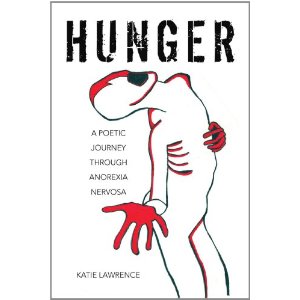- Q: What is your book about?

A: It’s about anorexia nervosa and my struggle through it and how I found my voice through poetry therapy. Things that I couldn’t say out loud, that I couldn’t find a voice for, I was able to find voice for in poetry therapy and was able to express my feelings through poetry in a way I never could otherwise have done.
Q: What inspired you to write a book about your battle with anorexia?
A: Mostly I wanted to be able to help anyone who has an eating disorder to help them find a way to get out the battle of an eating disorder, any sort of eating disorder, not just anorexia, like bulimia. Hopefully I can touch just one person and help them find their way through this dark pit of despair
Q: What exactly is “poetry therapy” and how does it work to help people dealing with anorexia nervosa?
A: It’s not about writing good poems—it’s about expressing feelings through poetry. Poetry therapy helped me because I was able to find my muse and find my way of expressing feelings that I’d never been able to express in words, and through the process of working with my therapist she was able to steer me to poems that at first I just reacted to in paragraph form and later I would write my own version of that poem and eventually wrote my own poems. I just found great release in being able to write about how I was feeling.
Q: What was it like to write and put together a poetic journal?
A: It was a matter of choosing which poems I wanted to include that would have the most significance in other peoples’ lives. It was quite prolific; I would write quite a few poems each day, so it was a matter of going through the poetry I’ve written (I started [writing the book] about a year ago and started poetry therapy about 2 years ago) and just choosing the ones I felt would be most persuasive and most emotionally connected to people with eating disorders.
Q: Can you tell us about your experience with anorexia nervosa? How did you deal with the struggle while you were at Staples?
A: I didn’t really acknowledge that I had an eating disorder for quite a number of years. When I was in middle school, I was short and chubby, and I got teased and laughed at about it. I went through puberty, grew a couple inches, and thinned out. I vowed I would never go back to being the chubby kid and being teased, and that’s when it all began. At that point I started to restrict what I started to eat. I made lists of good foods and bad foods, things that I would and wouldn’t eat. I hid it very well from everyone in high school, so no one really knew that I had it.
Q: So you had no idea you were dealing with anorexia in some of your early years?
A: I knew I had a problem—I didn’t know it would be anorexia. Anorexia was not really talked about [when I was] in high school. Now, in high school, they discuss eating disorders; when I was in high school it was never even discussed. I never even knew what it was until later in life.
Q: What is the message you want the student body of Staples to receive?
A: I would hope that anyone dealing with this would go and seek help from somebody, either a guidance counselor, teacher or other adult they trust, someone that can help them with this terrible disease and addiction that’s sometimes even harder to overcome than other addictions, since one must take up eating rather than give up other things
Q: Why exactly can it be classified as an addiction?
A: You become addicted to not eating. You lose all your cues towards hunger pains—you don’t feel those things. You become so consumed by what you will and won’t eat that it becomes addictive; you get a high off of not eating. You feel sort of better than other people because you can refuse to eat something that other people would eat and you get a real high off of refusing yourself.
Q: What would you most like to communicate through your book?
A: I hope that anybody who has a problem will seek out treatment and help—there are people out there who can help them. The whole point of writing the book was to get people to understand what is going on.













































www.popsunglassesinsummer.org • Jul 25, 2012 at 6:24 pm
Have you ever considered about adding a little bit more than just your articles? I mean, what you say is important and all. However just imagine if you added some great pictures or videos to give your posts more, “pop”! Your content is excellent but with images and clips, this website could definitely be one of the greatest in its niche. Excellent blog!
Kathleen Fuller, PHD • Apr 27, 2011 at 10:28 am
A wonderful and creative concept book to help raise awareness.